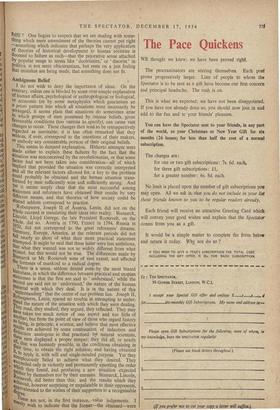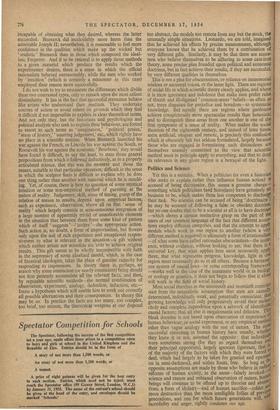Ambiguous Belief I do not wish to deny the importance
of ideas. On the Contrary, unless one is blinded by some over-simple explanation of human affairs, psychological or anthropological or biological, Or economic (or by some metaphysics which guarantees an a priori pattern into which all situations must necessarily be arranged), it seems plain that situations do sometimes arise iq which groups of men possessed by intense beliefs, given favourable conditions (too various to specify), can cause vast Changes to occur. These changes then tend to be retrospectively regarded as inevitable; it is less often remarked that they Seldom, if ever, correspond to the intentions of their makers, or embody any considerable portion of their original beliefs. This seems to demand explanation. Hitherto attempts were so Made either to explain these failures by the fact that the or situation was misconceived by the revolutionaries, or that some 1;1 factor had not been taken into consideration—all of which ag 'mplied that provided the situation was correctly interpreted of and all the relevant factors allowed for, a key to the problem of could probably be obtained and the human situation trans- 115 formed by men sufficiently wise and sufficiently strong. And :o• Yet it seems amply clear that the most successful among :ld statesmen and reformers have obtained their results by very et, different means, and that theories of how society could be altered seldom correspond to practice. the Robespierre, Joseph II of Austria, Lenin, did not on the a10 W, hole succeed in translating their ideas into reality. Bismarck, loi? Lincoln, Lloyd George, the late President Roosevelt, on the rid thole did so. Austria in 1790, France in 1794, Russia in of ,?20, did not correspond to the great reformers' dreams; Cy. Yermany, Europe, America, at the relevant periods did not all nearly so short of what their more practical statesmen pis attempted. It might be said that these latter were less ambitious, „Igo 'ot what they wanted, was not so widely different from what 114, tx.isted; but this would not be true. The differences made by 141 tmsmarck or Mr. Roosevelt were of vast extent, and affected the fortunes of mankind to a radical degree. nu There is a sense, seldom denied even by the most biased historians, in which the difference between practical and utopian StateSMen is that the first are said to understand; while the second are said not to understand,' the nature of the human the material with which they deal. It is in the nature of this licb bunderstanding ' that the centre of our problem lies. Joseph II, tios ,,':_cbespierre, Lenin, spared no trouble in attempting to under; III I "god the nature of the situation with which they were dealing. 0, `hey read, they studied; they argued, they reflected. They may Kaye taken too much notice of one aspect and too little of another, but from the point of view of those who regard history : being, in principle, a science, and believe that most effective results are achieved by some combination of induction and erluction analogous to that practised 13)1# natural scientists, sinew men displayed a proper temper; they did all, or nearly that was humanly possible, in the conditions obtaining in ;1* time, to obtain the right solution; and having obtained c;Lc apply it, with will and single-minded purpose. Yet they tots,r1sPicuously failed to achieve what they desired. They 10 'eeeeded only in violently and permanently upsetting the order set" Which1s .,/ they found, and producing a new situation expected R• oosevelt,lmer by themselves nor by their enemies. Bismarck, Lincoln, did better than this; and the results which they S vA ieved, however surprising or unpalatable to their opponents, • 4Proximated to the wishes of their supporters to a recognisable incapable of obtaining what they desired, whereas the latter succeeded. Bismarck did incalculably more harm than the admirable Joseph II; nevertheless, it is reasonable to feel more confidence in the qualities which make up the wicked but ' realistic ' Bismarck than in those which composed the ideal- istic Emperor. And if to be rational is to apply those methods to a given material which produce the results which the experimenter desires, there is a sense in which the official rationalists behaved unreasonably; while the men who worked by intuition' (which is certainly a misnomer in this case) employed their reason more successfully.
I do not wish to try to enumerate the differences which divide these two contrasted types, only to remark upon the most salient dissimilarity. It lies in the fact that successful statesmen behave like artists who understand their medium. They undertake courses of action or avoid others on grounds which they find it difficult if not impossible to explain in clear theoretical terms. And not only they, but the historians and psychologists and political analysts who seek to explain their behaviour, are forced to resort to such terms as imagination," political genius,' too abstract, the models too remote from any but the stock, the unusually simple situations. Leonardo, we are told, imagined that he achieved his effects by precise measurement, although everyone knows that he achieved them by a combination of very different gifts. Similarly, it may be that there are states- men who believe themselves to be adhering to some cast-iron theory, some precise plan founded upon political and economic doctrines, but in fact achieve their results, if they are successful, by very different qualities in themselves. This is not a plea for obscurantism, or reliance on immemorial wisdom or ancestral voices, or the inner light. There are regions of social life in which scientific theory clearly applies, and where it is mere ignorance and indolence that make men prefer rules of thumb and ill-digested common-sense' beliefs—as often as not, mere disguises for prejudice and boredom—to systematic knowledge. But equally there are regions where gardeners achieve conspicuously more spectacular results than botanists; and to distinguish these areas from one another is one of the first symptoms of a sense of reality. What makes the social theorists of the eighteenth century, and indeed of later times, seem artificial, utopian and remote, is precisely this confusion which is obscurely felt but seldom formulated, largely because those who are engaged in formulating such distinctions are themselves uneasily committed to the view that scientific method must in principle apply to everything, and that to deny its relevance in any given region is a betrayal of the light.



































 Previous page
Previous page